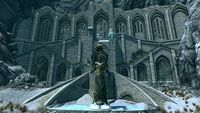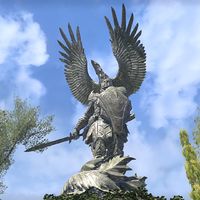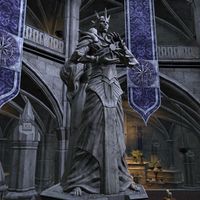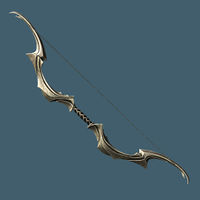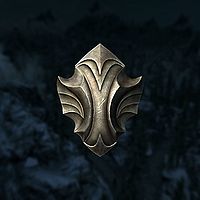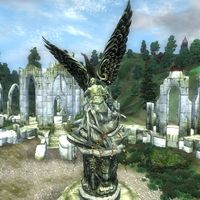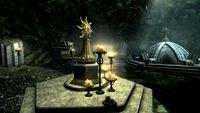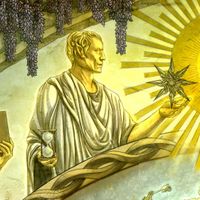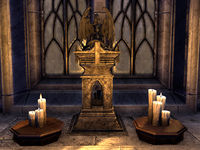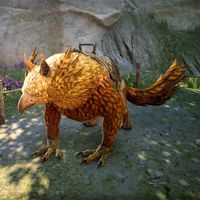Lore:Auri-El
- "Anuiel, who was the soul [of Anu and] of all things, therefore became many things, and this interplay was and is the Aurbis. At first the Aurbis was turbulent and confusing, as Anuiel's ruminations went on without design. Aspects of the Aurbis then asked for a schedule to follow or procedures whereby they might enjoy themselves a little longer outside of perfect knowledge. So that he might know himself this way, too, Anu created Auriel, the soul of his soul. Auriel bled through the Aurbis as a new force, called time." — The Monomyth, "The Heart of the World"
Auri-El (or Auriel),[1][2] King of the Aldmer,[3] is the elven analogue to Akatosh[3][4] and the chief deity of most Aldmeri pantheons.[3] He is the soul of Anui-El, who is the soul of Anu the Everything, and it is said time began with his existence.[2][3]
Most Altmeri and Bosmeri claim to be direct descendants of Auri-El. In Valenwood, he is known as Auri-El Time Dragon, king of the gods.[3] However, early, socially stratified Aldmeri society thought Auri-El to be an ancestor spirit of the upper castes, and his worship was adopted by other Aldmer to better emulate their social "betters".[5] While generally represented as a dragon, most Altmeri societies also depict him as or alongside an eagle.[6][7][8] Snow Elves and Ayleids also worshipped Auri-El.[9][nb 1] However, the Alessian Order cursed him and held his pride responsible for the sullied Middle Dawn.[10] All but the most dogmatic of theologians tend to agree that the Imperial Akatosh and the Elven Auri-El are one and the same.[11]
Mythology[edit]
Altmer-Heart of the World[edit]
- "[E]ven Auriel, when told he would become the king of the new world, agreed to help Lorkhan." — The Heart of the World
The Altmer believe that existence began with Anu the Everything, who encompassed and encompasses all things. Seeking to know himself Anu created his soul, Anui-El, who, also given to self-reflection, went on to create Sithis as the sum of all limitation via which he'd differentiate between his myriad attributes and ponder himself. An interplay which is the Aurbis.[2]
The primordial Aurbis was a place of chaos, as Anui-El ruminated without design. Seeking an escape, the Aspects of Aurbis asked Anu for a schedule they could follow to exist outside perfect knowledge. In response Anu created Auri-El, the soul of Anui-El, who spread through Aurbis as the force called Time, allowing the Aurbic aspects to understand themselves and take names.[2]
One of the aspects was Lorkhan, more of a limit than a nature, he wandered Aurbis planting new ideas based on restriction and outlined a plan to create a new world where even the aspects of aspects would be allowed to self-reflect, the Mundus. Many chose to follow, and even Auri-El was swayed by the promise of becoming king of this new world.[2] But Lorkhan had tricked the other spirits, as Mundus was a place composed almost wholly of limitation. Many of the et'Ada vanished completely, most of those left followed the flight of Magnus, becoming the Magna-Ge, but some of those present chose instead to stay after he departed keep working in the new world in order to keep it viable.[12][3] Among those Et'Ada who stayed, some would follow the example of Y'ffre, giving themselves to the Mundus fully to stabilize it and form the foundation of its natural law, and would typically be referred to from that point on as "Earthbones" or "Earth Bones". Others would choose not to give themselves fully but to populate Nirn instead, having to "make children just to last", these spirits would from that point typically be referred to as the "Ehlnofey".[UOL 1] The offspring of the Aedra would exhibit a gradual change however, each consecutive generation was weaker than the one prior, more removed from their progenitors in stature and might.[13][2]
Through this generational phenomenon of diminishment the offspring of the Ehlnofey would would eventually give away and the first Aldmer would arise, while the "weakest souls" that resulted from it would be formed by Lorkhan into armies he named "Men".[3][2]
This participation, an event the Altmer would name the Sundering,[14] would be considered Auri-El's only known moment of weakness, an act which forever sundered the elves from the spirit worlds of eternity.[3] Auri-El and the other gods of the Aldmer were disgusted by their enfeebled selves and what they had created, and insisted that everything was permanently spoiled, and all they would be able to do would be to teach the elves to suffer with dignity.[2]
To make up for his error, Auri-El led the original Aldmer against the armies of Lorkhan in mythic times, vanquishing him and establishing the first kingdoms of the Aldmer, Atmora and Old Ehlnofey.[3][2] During this conflict Auri-El begged Anu to take them back but Anu refused as he'd already created something to replace them. The more merciful Anui-El created Auriel's Bow and Auriel's Shield to be used by Auri-El against Lorkhan's hordes. Though Atmora was retaken by men and Old Ehlnofey was sundered, Auri-El's greatest knight, Trinimac (who, in some places, was even more popular than Auri-El[3][15]), succeeded in defeating Lorkhan, and Auri-El hid his Heart by attaching it to an arrow and sending it far into the sea.[2]. After Convention was held by the victors and the laws which would govern the mortal world were decided on,[16], the Aedra departed the world as their direct presence destabilized reality and time.[UOL 2] Auri-El ascended to heaven in full observance of his followers so that they might learn the steps needed to escape the mortal plane.[3][2]With this event the gods and magic in the mythic sense exited the world and history, finally linear, began.[2][12]
Auri-El is believed to currently reside in Aetherius alongside the other elven gods.[17]
Dunmer[edit]
According to Vivec, Stasis and Change, Anu and Padomay, are infinite forces and realms residing in the infinite Void, the latter infinity paradoxically enclosing the others in a manner akin to an encircling sphere. At the intersection of the two forces, where they touch, lies a "perfect circle of pattern and possibility", the Wheel, and inside that Wheel lies the Aurbis which is its foundation. Vivec claims that outside the Wheel exists the Void, which cannot truly be named and is bereft of anything. The Void is said to have more aspects than just Stasis and Change, but they cannot be named as they are outside of true language. Vivec claims Anu and Padomay "awakened" during the process of sub-creation caused by their intersection as "to see your antithesis is to finally awaken". It is said that in reaction to this "each gave birth to their souls", Auri-El and Sithis. Each of these souls regarded the Aurbis in their own part, and from that came the et'Ada, the "original patterns.[UOL 3]
Worship[edit]
Many Snow Elves had one great desire: to become one with Auri-El. They built the Chantry of Auri-El in the western mountains of modern-day Skyrim so that they could pursue a pilgrimage of spiritual discovery and ascend into the heavens.[18] They would recite the mantras of Auri-El at several wayshrines, meditating on their lessons, before journeying to the Inner Sanctum to ostensibly become one with their god, purportedly vanishing with a look of bliss on their face upon their meeting with the Arch-Prelate.[19]
The Altmer use the eagle both in association with Auri-El himself,[6][7] and as a symbol representing the Aedra, their ancestors, who descended from Aetherius and became trapped in physical form by the creation of Nirn.[20]. Altmeri prayers reference Auri-El as the Fixed Center of existence who always envelops all people and invoke him to grant his followers stability.[8]
Bosmer perform acts of veneration, primarily at the beginning of each year, which involve charitable work overlooked in the previous months. However, they hold little affection for him.[21] There have been cases of Bosmer undertaking knighthood as a form of devotion to Auri-El.[22]
The Khajiit acknowledge both Auri-El and Akatosh as aspects of Alkosh.[23]
Artifacts[edit]
Auriel's Bow[edit]
Auriel's Bow, (also spelled Auri-El's Bow) is an artifact used by the elven god Auriel. Although it takes the form of a modest elven moonstone bow, it is one of the most powerful weapons on Tamriel.
The bow draws its power from Aetherius itself, channeling it through the sun. It has the ability to turn any arrow into a "missile of death", although its enchantment effects vary: it has been known to cause magical fire or shock damage, drain an opponent's stamina and magicka reserves, or harness the power of the sun. It can also make the wielder immune to lesser attacks, and is especially devastating when used against the undead. Occasionally it can be seemingly unenchanted. Without Auriel's power behind it, however, the bow uses its own store of energy for its power. Once exhausted of this energy, the bow will vanish, abandoning its owner to reappear elsewhere.
Auriel's Shield[edit]
Auriel's Shield is an artifact used by the elven god Auriel, the Altmeri Akatosh, Dragon God of Time. It takes the form of a small shield, sometimes rounded, made from either ebony or moonstone. It has several magical abilities that help to make its wielder nigh invulnerable. Its known enchantments include resistance to fire, shielding from either magical or physical attacks, healing properties, magical armor enhancement, and spell reflection. Sometimes it also appears to be seemingly unenchanted.
The shield has the ability to absorb the power of blocked attacks; this energy can then be released by bashing an opponent with the shield, delivering a devastating physical blow. Its shielding ability is supposedly unsurpassed. The shield is twinned with Auriel's Bow.
Like many great artifacts, the shield has a life and personality of its own, and does not feel bound to its user. A popular fable tells of it abandoning its owner in her greatest hour of need, but this story is thought to be apocryphal. Legend says it was created by Anuiel at Auriel's request so that the latter could use it in his campaign against the forces of Lorkhan during the Dawn Era.
Gallery[edit]
Notes[edit]
- In the Dawnguard add-on for Skyrim, Serana notes that the statue of Auri-El outside the Inner Sanctum of the Chantry of Auri-El incorporates the "older signs" of his power.
- To the Snow Elves, Auri-El was strongly associated with the sun, and the Chantry of Auri-El features sun-shaped decorations throughout. The sun is described by Snow Elves as how Auri-El influences the world[24] and the channel through which Auriel's Bow draws its power from Aetherius.[9]
- Legends say Auri-El despises Orcs,[15] and that his scribe was Xarxes.[3]
- Saint Alessia is sometimes referred to as Auri-El's wife.[25]
- Auri-El's divinity has been understated in some cases. He is sometimes described as a quasi-mythical deity[26] or even a demi-god of the elves.[27]
- Aurielic Quasigriffs are considered sacred by some worshipers of Auri-El.[28]
See Also[edit]
Books[edit]
- The Monomyth — A theological book containing the common creation myths
- Touching the Sky by Parmion Saldor — An overview of Snow Elf pilgrimages to the Chantry of Auri-El
- Varieties of Faith... by Brother Mikhael Karkuxor of the Imperial College — An expansive list of the pantheons and associated divine spirits of Tamriel's dominant cultures
References[edit]
- ^ The Anticipations — Anonymous
- ^ a b c d e f g h i j k l The Monomyth
- ^ a b c d e f g h i j k l Varieties of Faith... — Brother Mikhael Karkuxor of the Imperial College
- ^ The Alduin/Akatosh Dichotomy — Alexandre Simon, High Priest of the Akatosh Chantry, Wayrest
- ^ Pocket Guide to the Empire, 3rd Edition: The Blessed Isle: Alinor and the Summersets — Imperial Geographical Society, 3E 432
- ^ a b Driftwood Idol contraband in ESO
- ^ a b Winged Auri-El contraband in ESO
- ^ a b Coils of the Father
- ^ a b Knight-Paladin Gelebor's dialogue in Skyrim
- ^ Staff of Towers — Holven
- ^ Artorius Ponticus Answers Your Questions — Bishop Artorius Ponticus
- ^ a b Before the Ages of Man — Aicantar of Shimerene
- ^ The Mystery of Artaeum — Penewen, Advisor to the Court
- ^ Folly of Man
- ^ a b The True Nature of Orcs
- ^ Aurbic Enigma 4: The Elden Tree — Beredalmo the Signifier
- ^ Serana's dialogue in Skyrim
- ^ Touching the Sky — Parmion Saldor
- ^ Events of Skyrim: Dawnguard
- ^ Elder Scrolls Online - Knowledge Base
- ^ The Improved Emperor's Guide to Tamriel: Valenwood — Flaccus Terentius, 2E 581
- ^ Brellin's dialogue in Oblivion
- ^ Natrada's dialogue in ESO: Elsweyr
- ^ Arch-Curate Vyrthur's dialogue in Skyrim
- ^ Remanada
- ^ Auriel's Shield description in Arena
- ^ Auriel's Bow description in Arena
- ^ Aurielic Quasigriff description in ESO
Note: The following references are considered to be unofficial sources. They are included to round off this article and may not be authoritative or conclusive.
- ^ Michael Kirkbride's Posts
- ^ Nu-Mantia Intercept — Nu-Hatta, The Imperial Library
- ^ The Thief Goes to Cyrodiil — Vivec
|
|||||||||||||||||
|
|||||||||||
|
|||||||||||
|
|||||||||||
